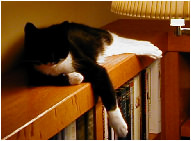February 28, 2006
Sukuks
A friend e-mails, concerning the ports controversy:
Anyway, something that's bugged me in Michelle Malkin's posts on this has been her hang-up on the "sukuk." For example, in this post she says, "The supporters of, and retreaters on, the deal are also silent about the unprecedented, Islamic law-compliant funding scheme that allowed state-owned Dubai Ports World to force its more experienced rival to drop its bid for P&O. (The underwriters of Dubai Ports World's $3.5 billion Islamic financing instrument called a "sukuk" --Barclay's and Dubai Islamic Bank--were both cited as probable conduits for bin Laden money.)" Now, regarding Barclay and the Dubai Islamic Bank, I don't know anything - I doubt they're a shady operation devoted to bringing down the global economy and turning the world into an agrarian Caliphate, but I can't say for sure. But she portrays the sukuk as though it's some creeping sharia scheme or some such, which is just nonsense. In fact, I think the financing the best part of the whole deal.Observant Muslims are not permitted to loan money at interest, and aren't supposed to borrow money at interest either. That can make buying a home problematic. There are different ways to get around this - for instance, in my city there's an Islamic Co-op—you put down a down payment, and the co-op buys the house. Then you pay down the loan interest free—however, you also pay them rent on whatever proportion of that home they own. As you pay down the loan, the less of your monthly payment that goes to rent, and the more that goes to pay down the loan.
Now, I'm sorry, but I think it's just a linguistic game - it's just putting a different name on interest. Which is fine - they see this as rent and as being acceptable, and I certainly don't begrudge them that. It's a solid investment for members of the co-op, returning 5%-7%, helping their community, every borrower is also an investor - it's exactly the kind of help-yourself thing we encourage in America.
But the point is, investment options are hard to find for the diligent Muslim. One person I know works at Fidelity, and he can't invest in any of the products his company sells, because all of the funds and companies are investing money in interest-bearing vehicles somewhere along the line. He's said scholars agree that as long as no more than X% of the returns (5%, 8%, something like that) are from interest, that it's alright, as long as it also avoids liquor, pornography, gambling, etc. There are specific Halal mutual funds, but the options are pretty scarce.Michelle posts that Dubai has started its own stock exchange, and that this $3.5B sukuk is its crown jewel - here's a Halal investment, backed by this amazingly solid, safe asset - leases on US and other international ports. If you're observant and need to park a couple million dollars in something safe, and bonds are forbidden, and treasury bills and money market funds are out of the question, and suddenly this opportunity comes along - hell, this is a god-send.
So here's $3.5B, which is publicly traded - it's owned by investors large and small all across the Muslim world. I saw someone say that the UAE has 3.5 billion reasons to keep our ports safe and secure. But the larger point is that these 3.5 billion reasons will be shared across the middle and upper classes of the entire Islamic world. The sukuk makes these assets more valuable to a Muslim than they are to anyone else, simply because it now serves a market that it couldn't before.
Sukuk's are apparently becoming an important investment instrument in the world. That's good. We should encourage the Moslem world to buy more of America, and to think of us as an asset! Also, there's no Moslem "Vatican" to make the rules, so opinions on what's halal vary from one place to another. here's a piece on the Dubai sukuk financing the P&O purchase.
Keep in mind that Christianity also used to forbid usury, that is, loaning money to other Christians at interest. And these prohibitions probably arose for good reasons. In earlier eras money lending was often very destructive. In Low-Trust cultures you get very high interest rates and terrible punishments for default, often slavery. It tended to be what we call mafia loan-sharking.
Credit is necessary, and Christians got around the prohibition in various ways, just as Moslems do now. (Having Jews do the lending turned out to be a bad way around the problem, and led to much anti-Semitism.)
Posted by John Weidner at February 28, 2006 9:17 PM

